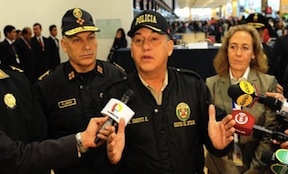Well over 100 political candidates in Peru have been linked to drug trafficking cases, highlighting the heightened risk of criminal infiltration in the government of the world’s largest cocaine producer.
According to Interior Minister Daniel Urresti, Peru’s anti-drug police have identified at least 115 candidates for municipal and regional government positions with ties to drug trafficking cases, reported La Republica. Urresti said that while these candidates have previously been investigated for ties to the drug trade, they have not necessarily been convicted.
“We’re not saying they are drug traffickers, but we believe citizens have the right to know,” he stated.
Urresti said he would give the list of candidates to the country’s national electoral authority (JNE), which would take the necessary measures to prevent drug traffickers from infiltrating the upcoming October 5 elections.
The Interior Ministry is also compiling a list of candidates with ties to illegal mining, reported El Comercio.
Meanwhile, Congressman Jose Leon Rivera has announced a proposal to amend an exiting law on political parties so that parties who either sponsor candidates with ties to drug trafficking, or accept campaign financing from criminal groups, would be banned from participating in elections.
InSight Crime Analysis
Numerous Peruvian politicians have been implicated in criminal activity, including former President Alan Garcia, who has been investigated for allegedly accepting bribes from drug traffickers in exchange for granting official pardons. In 2013 alone, nineteen politicians — including three governors and five members of Congress — were investigated for ties to the drug trade.
Given the fact that Peru is currently the world’s largest coca and cocaine producer, it is unsurprising that some political candidates have been tied to drug trafficking. What is troubling, however, is that more than 100 politicians believe they have a shot at getting elected in spite of reported ties to the drug trade — a figure that points to a culture of impunity among the country’s political elite.
SEE ALSO: Peru News and Profiles
The extent of alleged criminal infiltration in Peruvian politics is reminiscent of Colombia in the 1980s and 1990s. In the most glaring examples of this phenomenon, notorious drug lord Pablo Escobar was elected to the House of Representatives in 1982, and President Ernesto Samper (1994-98) allegedly accepted an estimated $6 million in campaign contributions from the Cali Cartel.
While Interior Minister Urresti has taken steps towards exposing candidates with alleged criminal ties, making lists of names will likely do little to keep drug trafficking separate from politics unless his efforts are accompanied by tougher laws and a stronger judicial system.

